Newly understood benefits of polyphenols on the gut microbiome.
The friendly bugs in our gut help support the gut barrier as well as insulin resistance, weight management, cardiovascular disease, metabolism, and inflammation (1; 2; 3; 4; 5).
I love discovering new wrinkles as to how food, lifestyle, and supplements work together to support a healthy gut microbiome.
Today, you’ll learn one of those wrinkles as I discuss how polyphenols can act as prebiotics in the gut.
On the surface, it might be tough to get excited about chemical names like flavonoids, polyphenols, and short chain fatty acids – but trust me, these are necessary concepts to learn how to heal the gut and promote a diverse gut microbiome.
If you’ve heard about resveratrol from red wine, ellagic acid from pomegranate, epigallocatechin-3-gallate (EGCG) from green tea, or curcumin from turmeric – these are all examples of polyphenol extracts responsible for the health benefits from some of the most powerful foods and herbs on the planet.
Below you’revsll learn about flavonoids from licorice, citrus bioflavonoids, and polyphenols in strawberries, blueberries, cranberries and more are being used to support gut health.
How these amazing chemicals from food and herbs work hand in hand with our friendly gut bacteria is truly cutting edge & you’ll see more companies start to include polyphenols in their gut support formulations – so let’s dive into it so you understand why!
Plant Polyphenols and Short Chain Fatty Acids – a Necessary 1-2 Punch
Polyphenols
Polyphenols are chemicals in food that often help give the food its color and taste. They also are responsible for many of the touted benefits of eating a healthy diet.
Polyphenols have decades of research support for their anti-inflammatory, anti-cancer, anti-oxidant, and antimicrobial effects (6; 7).
Polyphenols have a large say as to why high fruit and vegetable consumption has been shown time and time again to reduce the incidence of most diseases.
Why supplement with polyphenols?
Natural polyphenols are not only low in the diet because of low intake of fruits and vegetables, the the content of polyphenols in produce is also less because of heavy pesticide use.
Plants produce polyphenols in response to stress. Non-organic fruits and vegetables are exposed to less environmental stress and produce less of these valuable polyphenols in response.
The solution?
1.) Eat more fruits and vegetables, organic & diverse when possible.
2.) Supplement with polyphenol-containing supplements.
Short Chain Fatty Acids
When bacteria breakdown food in the gut, they produce short-chain fatty acids (SCFAs) which act as fuel for key immune cells and the gut lining.
Acetate, propionate, and butyrate are the primary SCFAs produced in the gut (8).
Without adequate levels of SCFAs in the gut, mucosal health suffers – and healthy bacteria have trouble thriving.
Western diets are low in the fruit and vegetable raw materials that lead to the creation of SCFA’s. Westerners are less able to create and use SCFAs. As a result, the immune system and intestines function poorly – promoting inflammation, weight gain, and a range of metabolic diseases in the process.
- SCFA’s help protect against obesity and insulin resistance by modulating key gut hormones and giving a boost to mitochondria (9; 10; 11).
- SCFA’s also help boost the release of T regulatory cells which maintain immune balance and reduce unnecessary inflammation (12; 13).
These mechanisms are critically important for healthy aging. If we cannot use the SCFA’s properly, we lose out on the myriad of benefits.
One key prebiotic benefit of polyphenols is by helping the body use the SCFA’s it produces more efficiently. You can also supplement with SCFA’s to help support normal levels in the short-term.
Why Polyphenols are Important Alongside Short Chain Fatty Acids
Plant polyphenols help the body use the SCFA’s it produces.
Without polyphenols, it appears that more SCFA’s find their way in the stool – where they are wasted.
Alternatively, individuals who consume polyphenol-rich diets will lose less SCFA’s in the stool – and reap more of the metabolic benefits described above.
These elements work together to not only offer antioxidant protection in the body but also promote healthy microbe composition in the gut.
Polyphenols as Prebiotics
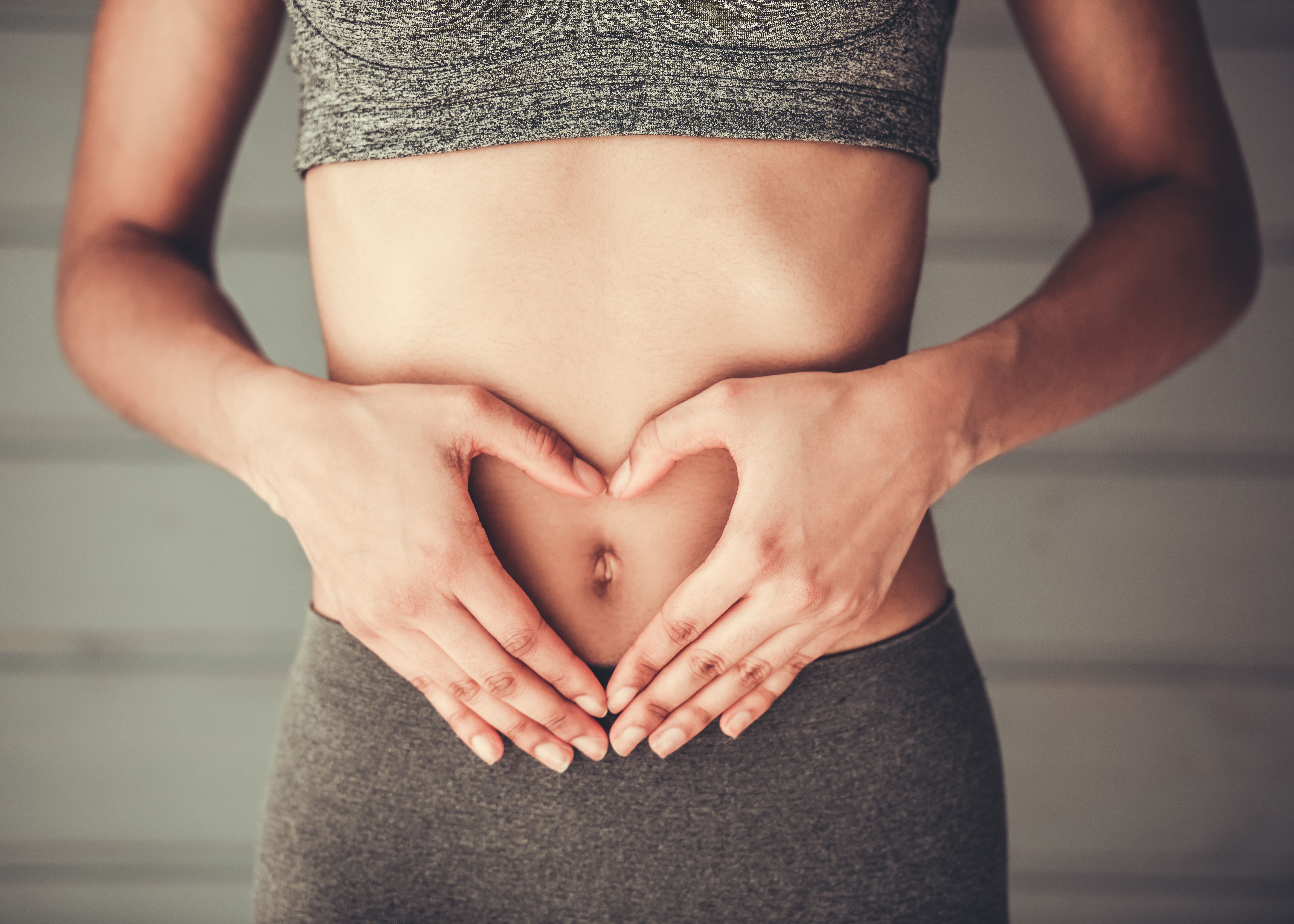 Our microbes can transform polyphenols into key metabolites that have important functions in the body.
Our microbes can transform polyphenols into key metabolites that have important functions in the body.
It is estimated that these metabolic activities of the gut microbiome are 100x greater than the metabolic activities of the liver (14).
The gut is truly a control center for the body influencing countless buttons and switches for the entire body. Without polyphenols, many switches in the command center cannot be turned on and off optimally.
Polyphenol compounds in food help drive healthy microbe composition – and in return, healthy microbes help us metabolize polyphenols into a wider range of compounds that help our physiology and further promote healthy microbe growth.
Polyphenols help us fully utilize the powerful benefits of SCFA’s for gastrointestinal, immune, and metabolic health.
We normally think of “prebiotics” as non-digestible fibers and starches from the diet such as inulin and fructo-oligosaccharides. Newer research points to dietary polyphenols having prebiotic roles too.
A prebiotic is any dietary compound that enhances the microbial composition of the gut. This definition now includes polyphenols!
“Polyphenol” is an umbrella term, which includes flavonoids and non-flavonoid polyphenols found in plants.
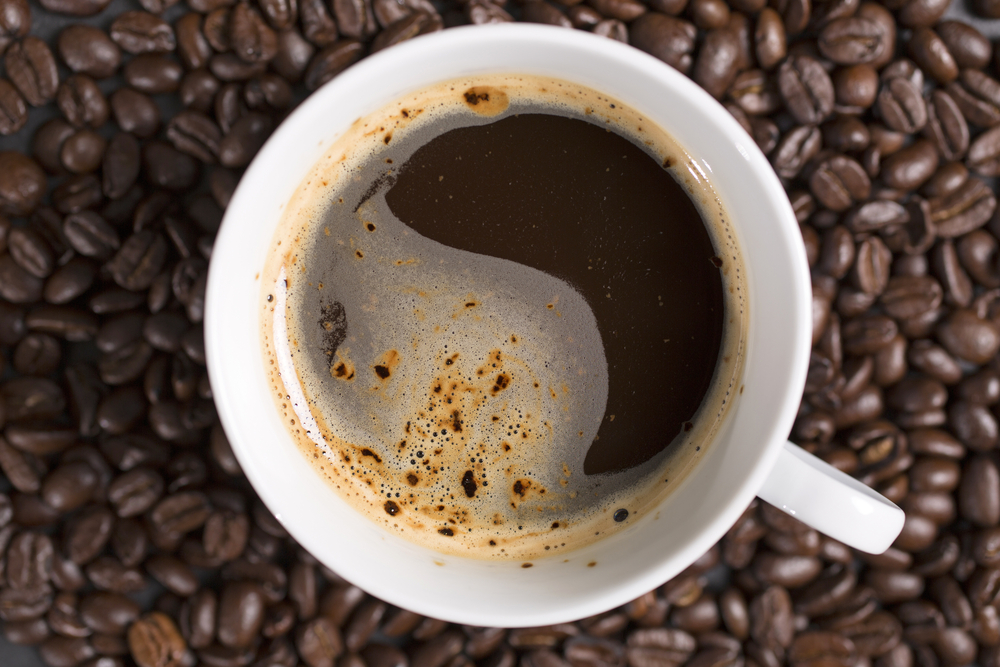
Coffee & chocolate lovers rejoice! Coffee, Tea, chocolate, pomegranates, blueberries, citrus fruits, and medicinal herbs all contain rich polyphenols that enhance our gut microbiome!
Polyphenols promote a healthy microbiome environment and, in return, a healthy microbiome helps us utilize the full benefits of polyphenols (15).
The more diverse polyphenols that you consume (and the more diverse your microbiome) – the more treasure you can derive from these valuable plant nutrients.
Highlights of Polyphenol Research
- The interaction between polyphenols and gut microbes is a two-way street. Healthy microbes help us get the most out of the polyphenols in our diet, and polyphenols support the presence of healthy microbes! The effects are reciprocal (16).
- Different microbes live in different sections of the gut. As polyphenols and flavonoids make their way through the digestive system – different metabolites are extracted and produced in different regions as the material passes through (17).As the metabolites are produced, they help determine how well good bacteria are able to adhere to the lining (while also preventing the ability of pathogens to adhere) (18).
- Some metabolites can travel along the gut-brain axis via the vagus nerve and influence brain activity and protect against neuroinflammation. This is one of the many ways a healthy gut and healthy diet promote brain health, cognition, and healthy aging (19)!
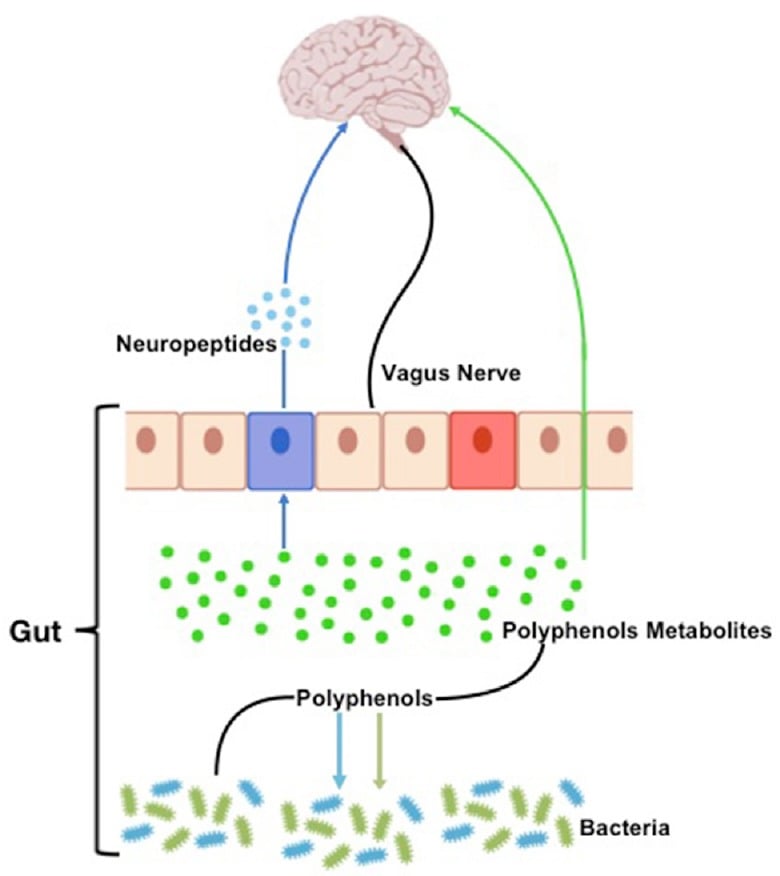 Image source: https://www.ncbi.nlm.nih.gov/pmc/articles/PMC6199944/
Image source: https://www.ncbi.nlm.nih.gov/pmc/articles/PMC6199944/
- Curcumin, a popular herbal extract from turmeric, is another polyphenol compound with a host of health benefits including that on the gut microbe environment. I often recommend Theracurmin HP for anti-inflammatory support.
- Licorice flavonoid support normal levels of H. pylori in the stomach, without disrupting healthy probiotics like Lactobacillus casei, L. fermentum, L plantarum, or Streptococcus thermophilus. The licorice flavonoids also support indigestion (dyspepsia) while also offering antioxidant, antiinflammatory, and anti-H. pylori benefits (20; 21).
Megaguard by Microbiome Labs contains a novel blend of licorice flavonoids, artichoke leaf extract, and high-potency ginger extract to support mucosal health, gastrointestinal motility, and normal levels of H. pylori. The flavonoid concentration is different than what you find in deglycyrrhizinated licorice (DGL).
- A number of studies support a protective effect of polyphenols on inflammatory bowel disease (22; 23). Polyphenol compounds help reduce excess or unwanted gas formation. As we discussed, they also boost SCFA production & utilization. As a result, polyphenol intake promotes gastrointestinal comfort and function.
- Polyphenols influence the composition of microbes – favoring healthy bacteria and disfavoring pathogenic bacteria (24). Balanced levels of gut bacteria promote healthy weight management.
- Lactobacilli and Bifidobacteria strains of gut flora thrive well in polyphenol-rich environments, whereas, pathogenic microbes do not grow well in the presence of the same chemicals (25)
- Blueberry polyphenols (proanthocyanidins) may increase Bifidobacteria while also demonstrating an ability to reduce the growth of E. coli 0157:H7 (263; 27)
- Plum polyphenols (as well as potential vitamins and minerals found in plum) promoted the growth of healthy gut bacteria (Bifidobacteria, Lactobacilli, and Faecalbacterium), and also increased the utilization of SCFAs in obese rats (28).
- The citrus bioflavonoid hesperidin promoted the proportionate growth of Bifidobacteria and Lactobacilli such as L. rhamnosus and demonstrated balancing effects on immune cells (29).
- Citrus bioflavonoids like those in PhytoFlora Microbiome Support or MegaMucosa may also help inhibit pathogenic gut organisms (30) in addition to anti-inflammatory / immune-balancing properties.
- Green tea and black tea polyphenols have selective antimicrobial effects against unwanted microbes (H. pylori, S. aureus, E. coli 0157:H7, S. typhimurium, P. aeruginosa, L. monocytogenes, MRSA, Candida, and viruses including Hep C, Epstein Barr, & HIV) (31), while simultaneously demonstrating “prebiotic” promotion of healthy Lactobacilli, Bifidobacteria, & Clostridium species (32; 33).
- Polyphenols offer a range of antimicrobial mechanisms and may help disrupt biofilm where pathogens may hide (34).
- Polyphenols may help increase the adhesion of healthy Lactobacilli bacteria to the gut lining while minimizing the adhesion of pathogenic bacteria (35).
- Polyphenols in berries selectively crowd out pathogenic bacteria like Salmonella, Staphylococcus, and Listeria (36)
- A healthy mucosal layer is necessary for gut barrier functions and an adhesion & feeding ground for healthy microbes.
- Polyphenols can also work together by chaining together and improving the physical health of the mucous layer (37), which promotes the growth & maintenance of healthy bacteria as well as the integrity of barrier functions of the gut.
- Akkermansia muciniphila was discovered relatively recently in 2004 and is considered a keystone microbe in the gut due to its ability to live in the mucosa and support its health along with the health of other beneficial bacteria.
- Cranberry polyphenols may help boost mucous secretion from special cells in the intestinal lining (38), which promotes Akkermansia growth (39), and then Akkermansia further boosts mucous secretion in a positive feedback loop (40).
- Flavonoid compounds support Bifidobacteria and Akkermansia muciniphila, which in return create SCFA’s and promote metabolic health, inflammation, and mucosal health (41).
- Polyphenols can also work together by chaining together and improving the physical health of the mucous layer (37), which promotes the growth & maintenance of healthy bacteria as well as the integrity of barrier functions of the gut.
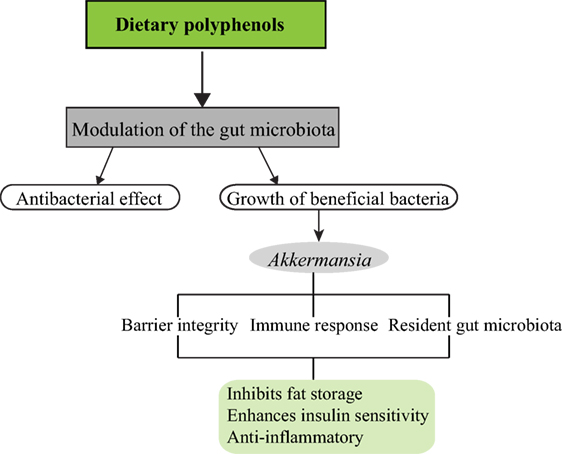
Image Source: https://www.ncbi.nlm.nih.gov/pmc/articles/PMC5529345/
Polyphenols – Anti-Inflammatory & Prebiotic Benefits that Sustain Gut Health
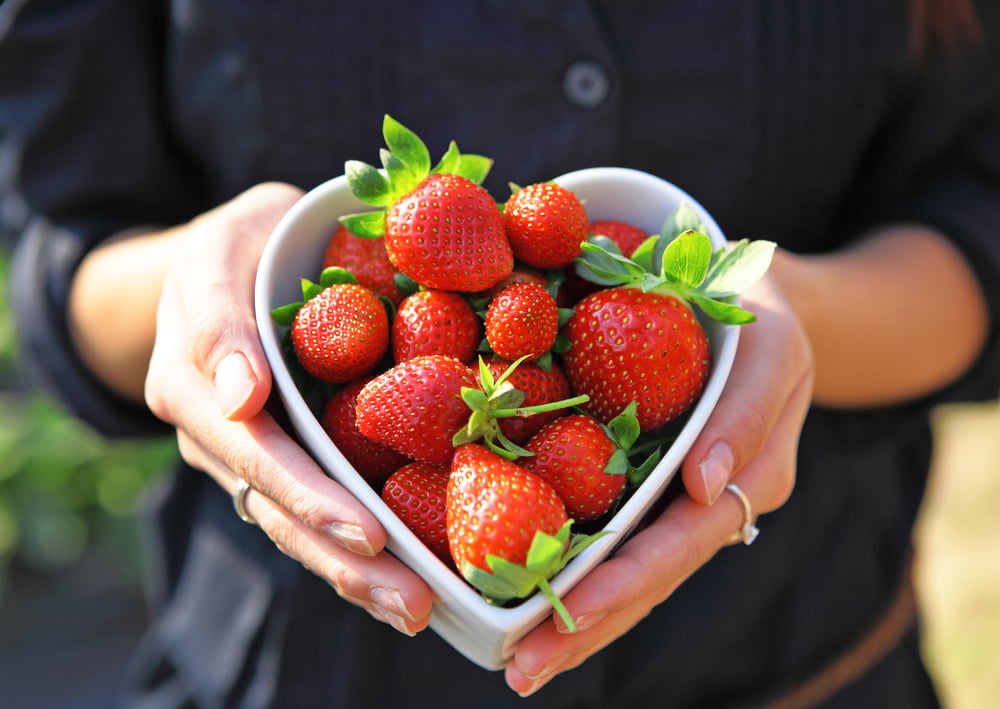 A gut cannot be inflamed and healing at the same time. Soothing inflammation is one of the core strategies to heal the gut lining and manage leaky gut.
A gut cannot be inflamed and healing at the same time. Soothing inflammation is one of the core strategies to heal the gut lining and manage leaky gut.
I’ve outlined the 7 Core Strategies to Heal the Gut Lining and Manage Leaky Gut previously.
What is Inflammation?
Inflammation is “caused” by shifts in immune cells intended to heal an injured part of the body.
It becomes a problem is when this shift is maintained even after the injury is healed or after an inflammatory trigger (food, infection, metal, inflammatory diet) is removed.
Polyphenol-rich foods and supplements help to bring these “shifts” back into balance. The rebalancing of immune cells is often what is referred to when a product or ingredient is said to have an “anti-inflammatory” effect.
A number of polyphenol-rich extracts in food and supplements offer prebiotic and anti-inflammatory benefits. Polyphenol consumption is an important component of any gut healing program.
Actively seek unique varieties of plants to integrate into your diet to enrich your intestines with these valuable nutrients.
Berries (blueberries, strawberries, cranberries, blackberries, etc) are great sources of these compounds, as well as colorful varieties of carrots, cauliflower, and other root vegetables that are more likely to be available in your local grocery store.
For others, try out ethnic grocery stores, or check out farmer’s markets where new varieties of old favorites can be freshly available.
Of course, supplements are available such flavonoids found in PhytoFlora Microbiome Support, Daily Phyto Balance, MegaGuard, MegaMucosa or C-1000 Plus, the berry, tea, and grape polyphenols found in Stem XCell, and the anti-inflammatory and detox support of Curcumin or Quercetin.
Summary: Benefits and Mechanisms of Polyphenols as “Prebiotics”
1.) Help the body create & better utilize the SCFA’s it produces (SCFA’s are otherwise wasted and released in the stool). The benefits of SCFA’s are many and wide-reaching.
2.) Support the microscopic structure of a healthy mucosal lining & boost the production of mucus in the first place. Polyphenols can link together and form the “connective tissue” of the mucus layer – providing a healthy environment for good bacteria to attach and thrive.
3.) Help crowd out and kill unwanted organisms – while simultaneously supporting the growth of healthy organisms and their ability to adhere strongly to the gut lining.
4.) Reduce inflammation and quench excess free radicals to give the mucosal lining the ability to heal and house healthy bacteria in the first place.




